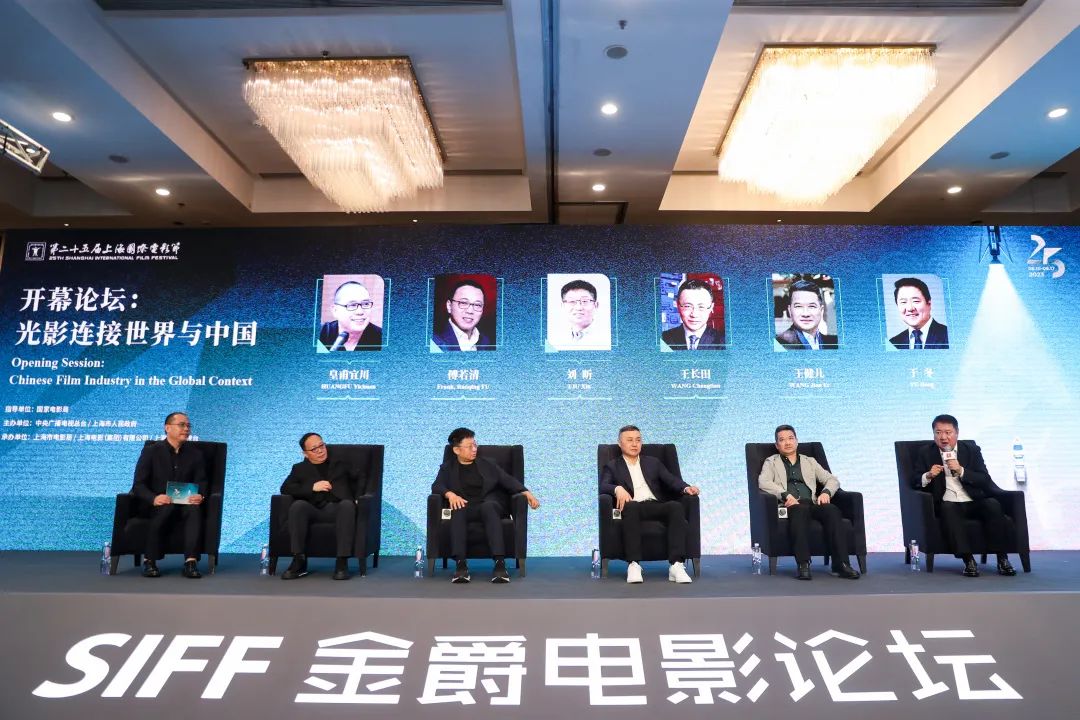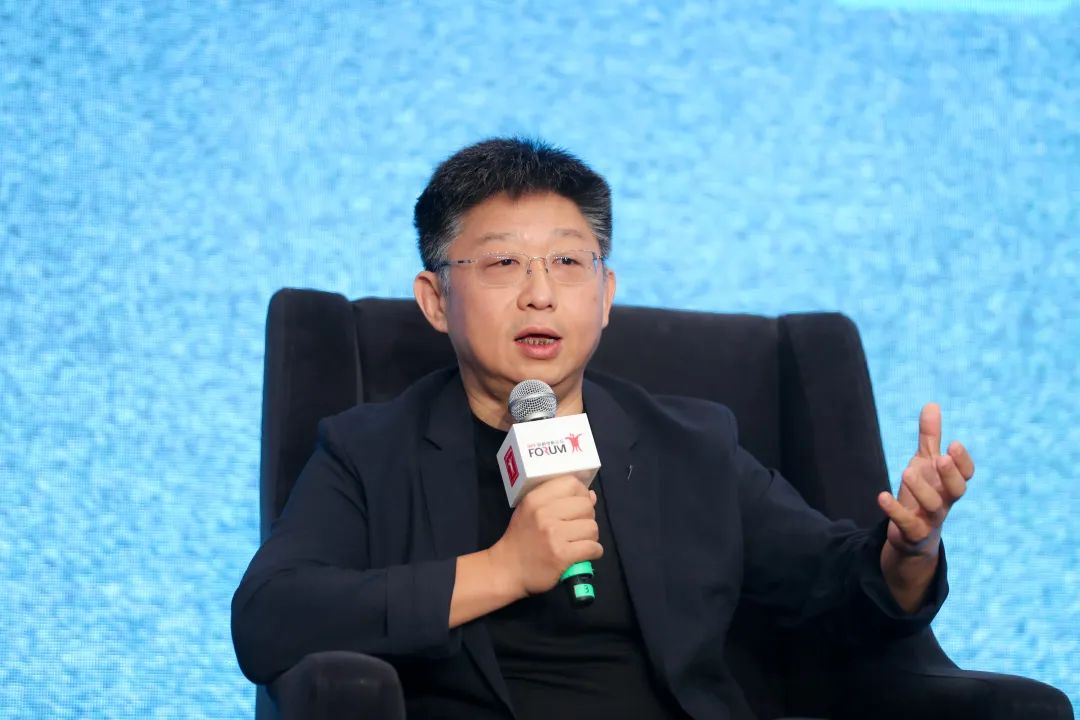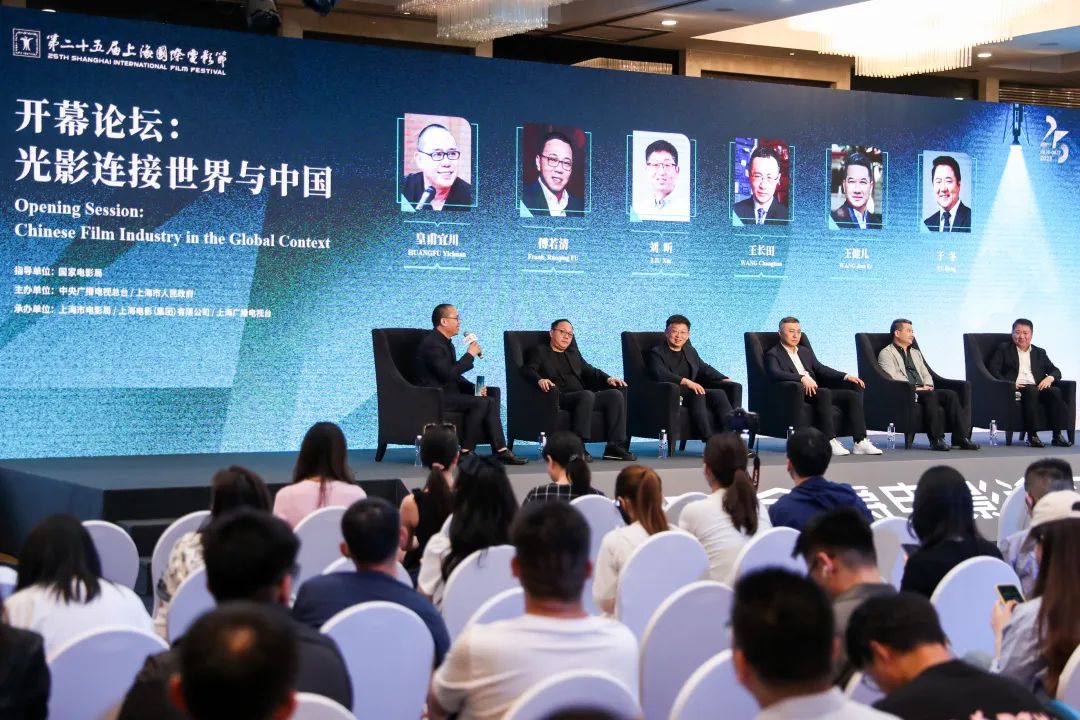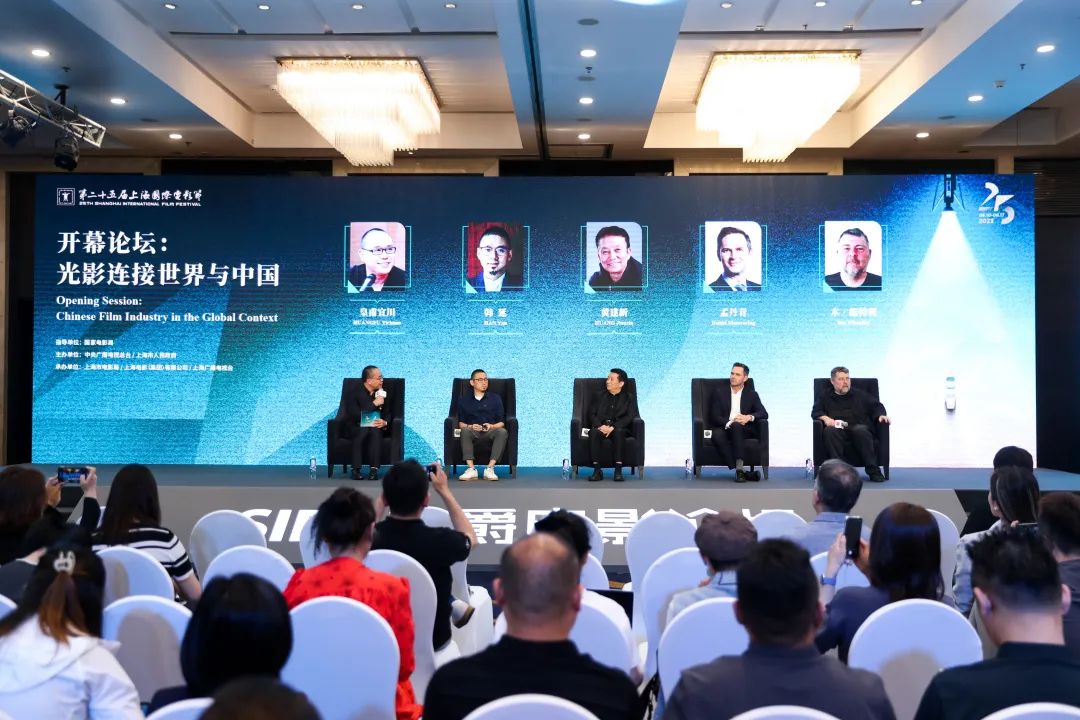SIFFORUM|Chinese Cinema’s Mission - To Connect the World with China
The opening session of the SIFFORUM of Shanghai International Film Festival (SIFF), themed “Chinese Film Industry in the Global Context,” was held this morning. According to the participants, as the Chinese cinema now is stepping on the fast track of high-quality development, the film industry is playing an increasingly significant role in international cooperation and exchange.
Growing Storytelling Skills of Chinese Films

When it comes to the “Chinese Film Industry in the Global Context,” the participants agreed that the most crucial thing for setting Chinese films in the global context is to tell China’s own stories. In recent years, the story-telling skills of Chinese films have seen continuous improvement, which has directly contributed to their market share.
Fu Ruoqing, Secretary of the Party Committee and Chairman of China Film Group Corporation (CFGC), revealed that domestic films have generated 80% of the box office in China’s film market, and the main reason behind this figure is the improved storytelling skills of Chinese films.
“There is now an increased demand from mainstream audiences for Chinese stories, and for empathy and resonance with the people and events around them. And it is precisely Chinese films that can now meet these needs for them,” Fu Ruoqing said. “Coupled with the fact that the technical expression of domestic films and the creative ability of directors are also upgrading, it is possible to meet the needs of a large portion of the audience. So, domestic films can readily attract mainstream audiences from the perspective of cultural confidence,” he added.

Fu Ruoqing
Secretary of the Party Committee and Chairman of China Film Group Corporation
This was echoed by Wang Jian’er, Secretary of the Party Committee and Chairman of Shanghai Film Co Ltd (SFC). More than a year ago, SFC and several other units jointly produced the Shanghai-dialect film B FOR BUSY. It was popular with white-collar female audiences in major cities, with some female audiences in Shanghai watching it five or six times. “Why does it have such an impressive appeal? I think it’s probably because it’s very sophisticated, elegant, multicultural, inclusive and true to life,” Wang Jian’er said. “It shows the reality of love relationships from the perspective of female audiences, and I should say that it portrays the image of today’s edgy, modern, independent women.”
This is certainly a sign of the improved storytelling skills of Chinese films. Wang Jian’er also cited the animated work YAO-CHINESE FOLKTALES, produced by SFC earlier this year and available exclusively on Bilibili. It was also popular among young people, with 250 million reposts. One of them, called NOBODY, had started off with an opening score of 9.9 on Douban. “Why is it such a hit? One of the key reasons is that the main character in this episode, the little pig demon, is shaped as an ordinary worker, which is identified by many newcomers and young people in the workplace.”

Wang Jian’er
Secretary of the Party Committee and Chairman of Shanghai Film Co., Ltd.
High-tech Empowered Development of the Film Industry
A good film must come with not only a good story, but also high technology. In Fu Ruoqing’s view, cinema is a product of technology and art. “If films are not enriched and promoted by technology, many artistic expressions and presentations will be hollow and plain,” Fu Ruoqing said. “We can imagine that the expressive ability of the black-and-white silent film era back then will surely not appeal to audiences today. Film is the practice and application field of the most recent technology.” Fu Ruoqing disclosed that THE WANDERING EARTH 2, released earlier this year, was a blockbuster, and in order to make this science fiction film, CFGC had hired more than 20 scientists as advisors, an unprecedented initiative.
As the jewel in the crown of the audiovisual industry, the film and TV industry is a showcase for the entire technology portfolio, and it should always be the most active embracer of technological innovation, said Liu Xin, General Manager of MIGU under China Mobile. In Liu Xin's opinion, high technology is more than just an enrichment and spice for films; it is literally changing film production itself. “High-tech can make new ways of expression available to creators. The ways and means you tell your story, the effect you present to the audience, all show a compressed nature in terms of cost and time. The expressive power of cinema is thus freed up significantly.”

Liu Xin
General Manager of MIGU under China Mobile
The impact of high technology on film production is not only visible in creation but also in presentation. Wang Changtian, Chairman of ENLIGHT MEDIA, said that AI could increase the efficiency of the main links of animated films by 50%, meaning that where we had planned to release three animated films per year, we now have the opportunity to do four, and that's just some of the benefits. Wang Changtian is very concerned about how VR will change the distribution and projection of future movies. “In the future, if you buy a movie ticket online, you can watch it in a movie theater or on your own VR device. Maoyan will push the movie to your VR device, and you can enjoy a movie-watching experience comparable to a movie theater at home.”

Wang Changtian
Chairman of ENLIGHT MEDIA
Yu Dong, Chairman and President of BONA, is keenly aware of the fundamental changes that high technology has brought to film distribution and projection. Although some new technologies are not yet able to be applied to the big screen and are still at the stage of small-screen application, the situation may change in the next few years, he said. “So, the top priority for cinemas right now is to enhance the theatre effect and improve audio-visual technology and the projection quality. We need to intensify the competition with small screens and make significant progress toward immersive viewing experiences.”

Yu Dong
Chairman and President of BONA
Quality Development of the Film Industry, a Composite Proposition

Will the pairing of a good story and high technology alone deliver a quality film? As perceived by the participants, the quality development of the film industry is a composite proposition and cannot be viewed through a simplistic approach. Fu Ruoqing said the high-quality development of films is in fact a supply-side reform. It is necessary to create more films with richer connotations and diversified genres aside from the unique artistic charm. At the same time, we must respect the market and the audience, because in a film market without end users, the supply of films is meaningless. In the past, many Chinese films might win awards around the world, but they failed to resonate with audiences. It was all for the sake of creation among creators, and such films cannot be described as quality development.
Wang Jian’er also believes that the solution to the high-quality development of the film industry lies in the basic logic of input and output. He has recently been considering: “We have been stressing good stories for so many years, but good stories are always in limited supply, so how can we prolong the effect of a good story when we have one?” Wang Jian’er says that it is not rare to see cases abroad where a major IP series can be worked on for decades. That’s why he also firmly believes that the path of major IPs is the right choice for the high-quality development of Chinese films. “First of all, we need to have the ability to produce and create major IPs, and at the same time have a long-term plan to make them sustainable. Otherwise, if we are all betting on the box office, I think it is probable to lose money, as it is impossible for us to balance the overall input and output.”
Wang Jian’er believes the advent of the AI era has generated new chances, unlocking more possibilities for us with “IP + AI.” SFC has many wonderful classic IPs that have been evolving over the years, and AI has changed the landscape for them all at once. Recently, SFC has been trying to make Huluwa into digital persons, so that the Huluwa digital dance troupe can challenge the real-life street dance troupe.
The vital role of films in international cooperation and exchange

In director Huang Jianxin's eyes, it is a natural process to set the “Chinese Film Industry in the Global Context,” as film should play an important role inherently in international cooperation and exchange. “For my own experience in film, I have worked with a number of multinational companies over a decade ago, including the Big Six in Hollywood. International cooperation in film is very meaningful,” he said. “Because film is the art of calling for peace, it serves to bridge the spiritual worlds between different countries and nationalities, and then establish an emotional connection, so film will bring about more significance in this sense. We have always expected that filmmakers could clear the way toward a connected world community in our own way,” Huang Jianxin said.

Huang Jianxin
Director
Ben Wheatley, director of MEG 2: THE TRENCH, says he is trying to build that connection. MEG 2: THE TRENCH is an example of co-productions between Chinese and U.S. filmmakers. “I feel that it’s not about the differences between Eastern and Western cultures, like RUSH HOUR, but about the natural interplay of Eastern and Western elements. There was a lot of exchange and negotiation during the filming process, constantly bringing Eastern and Western cultures together, while making sure that both sides were able to further bring out the best in themselves.”

Ben Wheatley
Director
Daniel Manwaring, CEO of IMAX China, believes that the increasingly obvious impact of word-of-mouth on film box office is a particularly good trend for the entire film market and film industry, inspiring not only filmmakers to make better stories, but also IMAX to deliver a richer experience to audiences. Humans have the DNA of group social entertainment and we like to be with others to hear and see stories. The cavemen would sit around a campfire and listen to stories, when in fact the campfire was the big screen we have now, with only the format being changed.

Daniel Manwaring
CEO of IMAX China
Han Yan, director of the opening film of this year’s SIFF – LOVE NEVER ENDS! – said: “As creators, there is a trap in diversification as in internationalization. That is, we cannot diversify for the sake of diversification and be international for the sake of internationalization. This is why we repeatedly mentioned to tell Chinese stories. We shouldn’t blame the audience for being prudent and picky. As creators, we should reflect on whether we are too self-indulgent, and we shouldn’t hold art lofty in a shrine that is far from the audience. To be artistic and to be down to earth, I think, are not contradictory at all.”

Han Yan
Director







